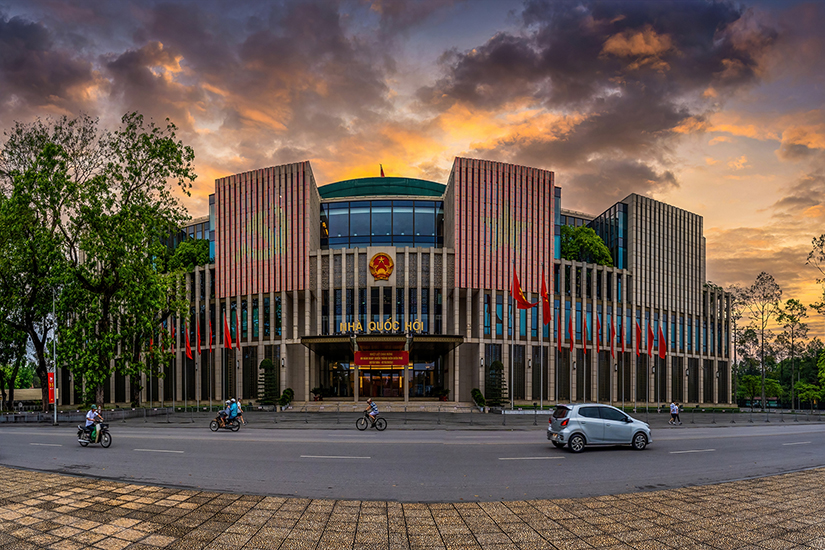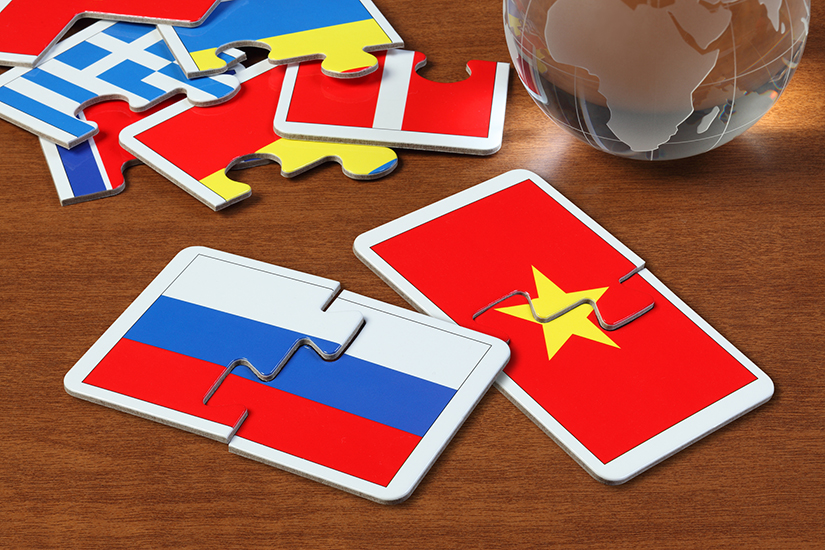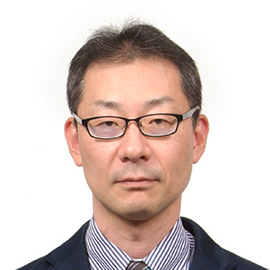On May 2, 2024, the Vietnamese National Assembly convened an extraordinary session and passed the dismissal of National Assembly Chairman Vương Đình Huệ. Just over a month earlier, President Võ Văn Thưởng had also been removed from office. It is "historically" unusual in Vietnam's political leadership appointments for resignations and replacements to occur mid term rather than at the time of the National Party Congress, which is held every five years. However, in recent years, this unusual pattern has been somewhat "normalized.” What is behind Vietnam's political upheaval, and will there be external consequences from this internal instability? This short review explores the background of this string of resignations and their impact on economic and foreign policy.

The resignation dominoes of the political leadership -- have the fires been stoked so much the furnace has started burning?
A resignation drama among the so-called "four pillars" (Tứ trụ) of the political leadership, consisting of the top four political roles (General Secretary of the Communist Party, President, Prime Minister, and Chairman of the National Assembly), began in 2023. In January of the same year, President Nguyễn Xuân Phúc resigned and was replaced by Võ Văn Thưởng, a member of the Party Politburo and Executive Secretary of the Party Secretariat. Just over a year later, President Thưởng resigned, and a month later, the Chairman of the National Assembly Huệ resigned. The political leadership, which had been inaugurated at the 13th National Party Congress in 2021, would see three members replaced over a period of three years. It was an unprecedented event, and unprecedented in its frequency, for a member of the political leadership to be replaced mid term following resignation rather than a death.
The resignation drama spilled out beyond the bounds of the top leadership. Deputy Prime Minister and Minister of Foreign Affairs Phạm Bình Minh and Deputy Prime Minister Vũ Đức Đam resigned just before the resignation of President Phúc. Politburo member Trần Tuấn Anh resigned in January 2024, just before the resignation of President Thưởng. Permanent Member of the Secretariat and Head of the Central Organization Commission Trương Thị Mai resigned just after the resignation of Chairman Huệ. This means that six of the 18 Politburo members elected at the 13th National Party Congress, or one-third, have resigned.[1]。
Behind the string of resignations is an anti-corruption campaign strongly promoted by Communist Party General Secretary Nguyễn Phú Trọng. This is known as the “blazing furnace campaign” (chiến dịch đốt lò) and was initiated shortly after General Secretary Trọng took office, continuing for more than a decade hence. The campaign has been intensified in recent years, with the direct cause of this being two major corruption scandals that occurred amidst the Covid crisis. The first was a corruption case involving a medical equipment manufacturer's new coronavirus test kits, which led to the arrest of the Chairman of the Hanoi People's Committee, the Minister of Health, and as many as 100 other manufacturing officials and civil servants. The second case involved the licensing of special flights for returnees that replaced scheduled flights that had been suspended due to the Covid crisis, leading to the arrest of the Vice Minister of Foreign Affairs, other ministry officials, and more than 30 travel agency employees.[2] The resignations of the two aforementioned Deputy Prime Ministers stemmed from their respective responsibilities to oversee the Ministry of Health in the case of Deputy Prime Minister Đam and the Ministry of Foreign Affairs in the case of Deputy Prime Minister Minh. The resignation of President Phúc was an extension of this, while the resignations of President Thưởng and Chairman Huệ took place for their parts in another corruption case.
Thus a "culture of resignation," in which a figure overseeing an organization or person involved in a major case of corruption takes responsibility for the event by resigning has become semi-compulsory through General Secretary Trọng's initiative.[3] The campaign to clean up corruption has become so intense that top political figures have resigned one after another, even if they have not been arrested, leading to a situation where the “blazing furnace campaign” has begun to “burn the furnace itself from stoking too much.”
Signs of a power struggle over who will be the next Party General Secretary
Although the anti-corruption campaign was intended to enforce the Party's discipline and reinforce the public's trust in the Party, it has also taken on the appearance of a power struggle. General Secretary Trọng, who is serving an unusually long third term and has been the subject of health concerns due to his advanced age, is likely to be replaced at the 14th National Party Congress scheduled for 2026. Prior to the string of resignations in the political leadership, former Chairman Huệ and former President Thưởng were considered the leading candidates for the role of next General Secretary, but now former Public Security Minister Tô Lâm, the current President, has emerged as a strong candidate. President Lâm has been the right-hand man to General Secretary Trọng in his anti-corruption campaign, and has overseen a series of major corruption cases. It is believed that he was selected for promotion from the position of Minister of Public Security to President in recognition these achievements.
However, detractors have noted that the appointment of a General Secretary from a public safety background would be unprecedented, and that it would thus be challenging for him to gain the confidence of the Party's Central Committee members.[4] Prime Minister Phạm Minh Chính, the current "survivor" in the political leadership, will also be eyeing the General Secretary's position. The race to become General Secretary usually intensifies in the leadup to the National Party Congress. Officially, the General Secretary is elected through a vote of the Party's Central Committee members, but information about the process is thoroughly concealed, and very little information about it leaks out. The outcome of the General Secretary race, which has about 18 months to go, remains uncertain.

Economic impact
Since the Đổi Mới (Renewal) policy in the mid-1980s, Vietnam's economy has achieved remarkable growth, and the country's appeal in terms of attracting foreign direct investment, which was the driving force behind this development, was political stability. Vietnam, with its one-party Communist Party system, has been claiming that this continuity in the political environment is suited to foreign investment, reading as "stability" the fact that the political system does not change and the political leadership succeeds in an orderly fashion after National Party Congresses. Now, that stability has been shaken. Currently, there are no signs of a decline in foreign investment or capital flight due to political instability, but Vietnam watchers are concerned that such a situation may arise.[5]
More apparent than the anti-corruption campaign is the paralysis of the bureaucracy, which is manifesting itself as a more obvious adverse effect. Bureaucrats are said to be shying away from administrative procedures for fear of being caught out. A derivative effect has been the emergence in delays to procedures as a result of the arrest of administrative officers in the licensing line.[6]
Impact on foreign policy
In recent years, Vietnam has been promoting a diplomatic stance that maintains strategic autonomy by adopting a flexible policy in response to the external environment and domestic situation, while promoting its national interests and not giving in to any particular country, under the banner of "bamboo diplomacy."[7] Even in the midst of an intensified anti-corruption campaign and political instability, this basic foreign policy principle itself remains unchanged. In his inaugural speech, President Lâm also made it clear that he would continue the Trọng line, stating, "we will effectively adhere to and develop the diplomatic line of multifaceted and diversified foreign relations, maintain the characteristics of the 'Vietnamese bamboo' diplomacy, and proactively engage in international relations."[8]
However, the nuances of the way the bamboo sways have changed. Because of the unstable domestic political situation, the current political leadership does not have the luxury of effectively dealing with any instability in external relations, especially with China. For this reason, Vietnam has shown an exclusively deferential attitude towards China. Even in the potentially tense South China Sea, it has strictly refrained from taking a strong stance against China.[9]
Meanwhile, bold moves in external relations have also quieted down. The relationship with the U.S., which entered into a comprehensive strategic partnership relationship in 2023, has not made any significant progress since then. Rather, there was a noticeable reaffirmation of traditional relations with Russia. On June 19-20, President Putin paid an official visit to Vietnam to commemorate the 30th anniversary of the signing of the Treaty on Principles of Friendly Relations between Russia and Vietnam, during which he met with all four top political officials. President Putin's visit to Vietnam was an outstanding symbolic gesture, and although there were no new matters of cooperation between the two countries, the joint declaration clearly stated that "Russia appreciates Vietnam's balanced and objective position on the Ukraine issue" and reaffirmed the position of Vietnam, showing understanding towards Russia's position on its continued aggression against Ukraine.[10] Vietnam's prioritization of stabilizing relations with China and Russia, coupled with the concentration of power in the hands of General Secretary Trọng as a conservative ideologue, is indicative of the "conservatization" of Vietnam both internally and externally.

(The views expressed in this article are the author's own and do not represent the official views of the organization to which the author belongs.)
(2024/07/22)
Notes
- 1 "Fifth Most Senior Member of Communist Party Leadership Resigns, Charged with Violating Party Rules (Vietnam)," Japan External Trade Organization (JETRO) Business Brief, May 24, 2024.
- 2 Futaba Ishizuka and Shozo Sakata, "Vietnam in 2022: Achieving High Growth While Shaken by Large-Scale Corruption Cases," Institute of Developing Economies (ed.), 2023 Asian Trends Annual Report, pp. 199-200.
- 3 Futaba Ishizuka, "The logic of Vietnam’s anti-corruption fight observed from the “resignation” of the President," IDE Square, "Sekai wo Miru Me," (Institute of Developing Economies), February 2023.
- 4 "Chủ tịch nước Tô Lâm:. Ghế tổng bí thư có dễ dàng?" BBC Tiếng Việt, May 25, 2024.
(President Tô Lâm--can he easily win the General Secretary's chair?) - 5 Le Hong Hiep, "Two Presidents Ousted in One Year: What Lies Ahead for Vietnam's Political Outlook?", Fulcrum (ISEAS Yusof Ishak Institute), March 20, 2024.
- 6 "Politburo Members Lose Positions in Succession--Vietnam Tightens Corruption Crackdown," Yomiuri Shimbun, June 9, 2024.
- 7 Tomotaka Shoji, "Great Power Competition and Vietnam's 'Bamboo Diplomacy': The Reconfirmation of Omnidirectional Diplomacy," International Information Network Analysis IINA, August 31, 2023.
- 8 "Toàn văn Phát biểu Nhậm chức Chủ tịch nước của Đồng chí Tô Lâm," Nhân dân, May 22, 2024.
(Full text of Tô Lâm's inaugural State of the Nation address) - 9 Tomotaka Shoji, "Vietnam’s China Policy ― Deference and Check," International Information Network Analysis IINA, March 13, 2024.
- 10 "Tuyên bố chung giữa Cộng hòa XHCN Việt Nam và LB Nga về làm sâu sắc hơn quan hệ Đối tác chiến lược toàn diện trên cơ sở thành tựu 30 năm thực hiện hiệp ước về những nguyên tắc cơ bản của quan hệ hữu nghị Việt Nam-Nga," Nhân dân, June 20, 2024.
(Joint Declaration of the Socialist Republic of Vietnam and the Russian Federation on Deepening the Comprehensive Strategic Partnership on the Basis of the 30th Anniversary of the Conclusion of the Treaty on the Basic Principles of Friendly Relations between Vietnam and Russia)

